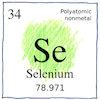Stockholm—Jöns Jacob Berzelius,
Johan Gottlieb Gahn
elements

|
Selenium
Jöns Jacob Berzelius and Johan Gottlieb Gahn owned a chemical plant that produced sulfuric acid by the “lead chamber” process. Berzelius was professor in chemistry and pharmacy at the Karolinska Institute in Stockholm. Gahn was chemist for the Swedish Board of Mines. They found a red precipitate in the lead chambers that burned with a smell like horseradish. It was like tellurium, named for the Earth, so they named it selenium for the Moon.
Atomic number 34
Selenium is sensitive to light; its electric resistance decreases when a light shines on it. Therefore, selenium is used in light meters, photocopiers, photocells, solar cells, and as a toner for developing black and white photographs.
Stuff with colors
Powdered amorphous selenium is brick red. Rapidly melted into beads, it’s black. Its most stable and dense allotrope, forming hexagonal structures, is gray. Selenium dioxide polymer is yellow. A little selenium is good for you, even necessary, but too much is a horse of another color.



That red stuff that grows on your leftovers in the back of your refrigerator—you might want to have it analyzed. Don’t ignore the element of chance.
See also in The book of science:
Readings in wikipedia:
Other readings: